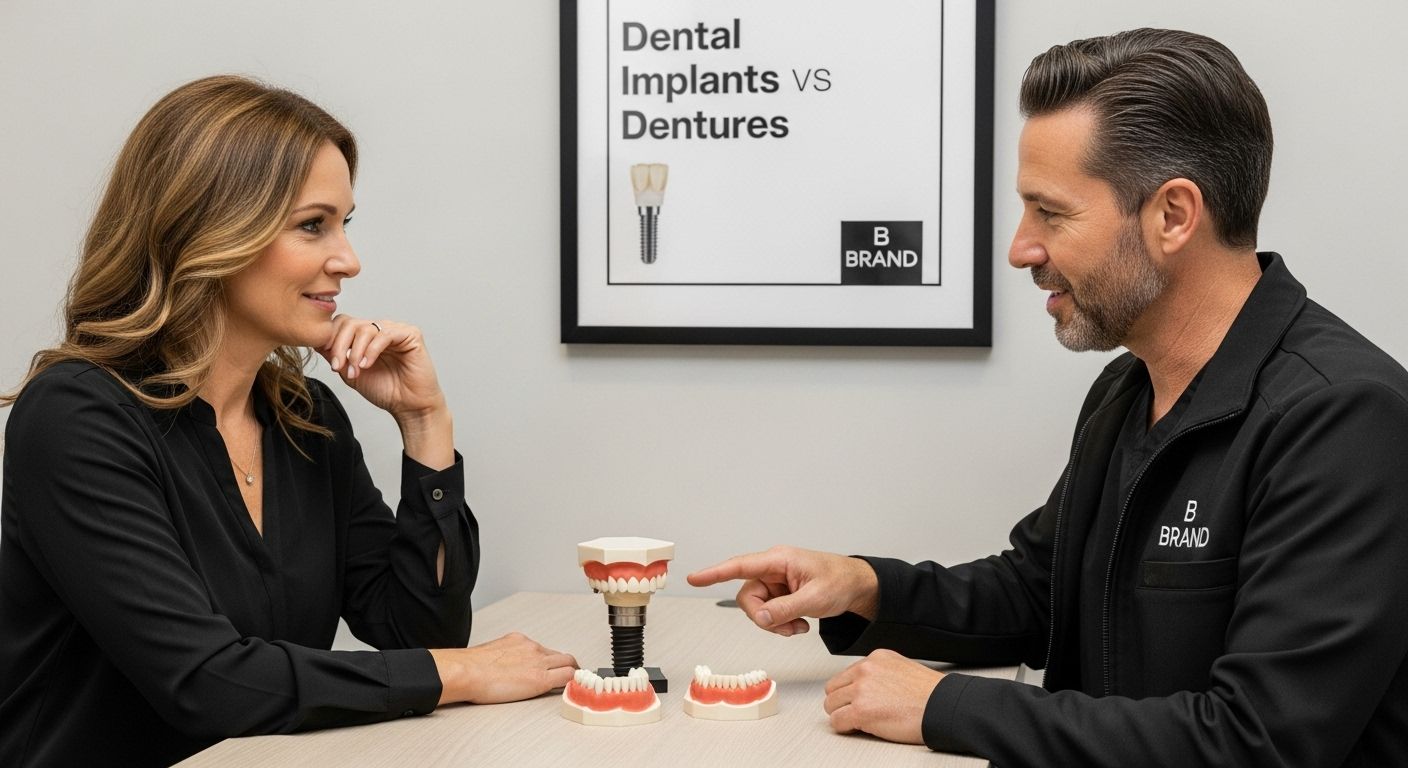
Missing teeth can impact everything from the way you eat to how confident you feel about your smile. People often think dentures are the classic fix for tooth loss, but dental implants are changing that picture fast. Over 3 million people in North America now have dental implants and the number grows by about 500,000 every year. The surprise is that implants do not just fill gaps, they actually help prevent jawbone loss and keep your facial structure strong in a way dentures simply cannot.
Table of Contents
- What Are Dental Implants And Dentures?
- Why Choosing Between Dental Implants And Dentures Matters
- How Dental Implants And Dentures Function
- Key Considerations In The Dental Implants Vs Dentures Debate
- Real-World Applications And Patient Experiences
Quick Summary
| Takeaway | Explanation |
|---|---|
| Dental implants provide a permanent solution | Implants are surgically placed in the jawbone, offering lasting support and preventing bone loss. |
| Dentures are removable alternatives | Custom-made prosthetics that can replace some or all teeth, designed for easy removal and maintenance. |
| Implants improve long-term oral health | They prevent jawbone deterioration and maintain facial structure, improving overall quality of life. |
| Financial considerations vary significantly | While implants may have higher initial costs, they could be more cost-effective over time due to lower maintenance and health issues. |
| Patient satisfaction differs significantly | Studies show implant patients report higher comfort and functional capability compared to those using dentures. |
What Are Dental Implants and Dentures?
Dental restoration solutions help individuals replace missing teeth and regain functional and aesthetic dental capabilities. Two primary options patients typically consider are dental implants and dentures, each offering unique approaches to tooth replacement.
Understanding Dental Implants
Dental implants are sophisticated medical devices surgically placed directly into the jawbone, serving as artificial tooth roots. According to the FDA Medical Devices Division, these structures provide a permanent foundation for replacement teeth. Implants are typically made from biocompatible materials like titanium, which integrate with human bone through a process called osseointegration.
Key characteristics of dental implants include:
- Permanent surgical solution
- Mimics natural tooth root structure
- Provides stable support for artificial teeth
- Helps prevent bone loss in the jaw
Comparing Dentures: A Removable Alternative
Dentures represent a more traditional and removable tooth replacement method. These custom-made artificial teeth can replace some or all missing teeth in either the upper or lower jaw. Medical experts describe dentures as prosthetic devices designed to restore both functionality and appearance for patients with significant tooth loss.
Dentures come in two primary types:
- Complete dentures: Replace entire sets of upper or lower teeth
- Partial dentures: Replace specific missing teeth while preserving remaining natural teeth
If you want to learn more about maintaining these dental solutions, read our guide on dental implant care.
Why Choosing Between Dental Implants and Dentures Matters
Selecting the appropriate tooth replacement solution is more than a cosmetic decision. It significantly impacts your oral health, comfort, functionality, and long-term quality of life. Understanding the nuanced differences between dental implants and dentures helps patients make informed choices tailored to their specific dental needs.
Below is a side-by-side comparison table summarizing key differences between dental implants and dentures to help clarify their main features and benefits.
| Feature | Dental Implants | Dentures |
|---|---|---|
| Permanence | Permanent, surgically placed in jawbone | Removable, not fixed to jawbone |
| Material | Biocompatible materials (usually titanium) | Acrylic resin and sometimes metal |
| Support for Replacement Teeth | Offers stable support, mimics natural tooth roots | Rests on gums, uses suction/adhesives |
| Bone Preservation | Prevents jawbone loss, maintains face structure | Does not prevent bone loss, may affect facial shape |
| Maintenance | Cared for like natural teeth; dental check-ups | Removed daily for separate cleaning |
| Comfort/Functionality | High comfort and eating ability | May need adjustments; can impact speaking/eating |
| Initial/Lifetime Cost | Higher initial cost, potentially lower over time | Lower upfront cost, possible ongoing replacements |
Long-Term Health Considerations
The choice between dental implants and dentures extends beyond immediate aesthetic concerns. According to research from medical experts, dental restoration options directly influence oral health-related quality of life. Dental implants offer substantial advantages in bone preservation and long-term structural integrity.
Key health considerations include:
- Preventing jawbone deterioration
- Maintaining facial muscle structure
- Supporting overall oral health
- Reducing potential future dental complications
Financial and Practical Implications
While initial costs vary, the long-term financial investment differs significantly between implants and dentures. Systematic research suggests that dental implants, despite higher upfront expenses, can be more cost-effective over time due to reduced maintenance and potential health complications.
Financial factors to evaluate:
- Initial procedure costs
- Maintenance expenses
- Potential future dental interventions
- Insurance coverage considerations
If you want to understand more about managing dental expenses, check out our guide on dental insurance options.
How Dental Implants and Dentures Function
Dental restoration technologies function differently, offering unique mechanisms for replacing missing teeth and supporting oral functionality. Understanding these distinct approaches helps patients comprehend how each solution interacts with their existing oral structure.
Dental Implant Mechanism
Dental implants operate through a sophisticated biological integration process. According to medical research, these devices are surgically embedded directly into the jawbone, creating a permanent artificial tooth root. The titanium post undergoes osseointegration, where bone cells naturally grow and fuse around the implant, creating an incredibly stable foundation.
Key functional characteristics of dental implants include:
- Direct bone integration
- Permanent surgical placement
- Mimicking natural tooth root structure
- Supporting individual or multiple tooth replacements
Denture Functionality
Dentures function as removable prosthetic devices designed to replace multiple or entire sets of missing teeth. Unlike implants, they rest on the gum surface and are typically secured through specialized dental adhesives or natural suction. Modern dentures are custom-crafted to match individual mouth contours, providing both aesthetic and functional restoration.
Denture performance aspects include:
- Removable and replaceable design
- Adaptable to changing oral structures
- Require periodic adjustments
- Support overall mouth functionality
If you want to learn more about maintaining these dental solutions, explore our detailed dental hygiene guide.
Key Considerations in the Dental Implants vs Dentures Debate
Choosing between dental implants and dentures involves carefully evaluating multiple personal health factors, lifestyle considerations, and long-term oral health objectives. Patients must understand the nuanced trade-offs associated with each tooth replacement option.
The following table highlights essential health and lifestyle considerations to weigh when deciding between dental implants and dentures.
| Consideration | Dental Implants | Dentures |
|---|---|---|
| Jawbone Health | Maintains bone density | Jawbone may deteriorate over time |
| Facial Structure | Preserves natural facial features | May result in changes to facial appearance |
| Impact on Adjacent Teeth | No effect on surrounding teeth | May require support from or affect nearby teeth |
| Eating & Chewing | Allows eating a diverse range of foods | Some dietary restrictions may apply |
| Daily Maintenance Needs | Brushed and flossed like natural teeth | Must be removed and cleaned every day |
| Comfort in Daily Life | Feels natural and secure | May feel less stable, especially at first |
| Adaptation Period | Minimal, post-healing | May require longer to adapt |

Health and Physiological Factors
Research from dental experts highlights the significant differences in how these dental solutions impact overall oral health. Dental implants offer superior bone preservation and minimize potential structural changes in facial anatomy, while dentures provide a more immediate and less invasive solution.
Key physiological considerations include:
- Long-term bone density maintenance
- Preservation of facial muscle structure
- Impact on adjacent teeth
- Potential for future dental interventions
Personal Lifestyle and Comfort Evaluation
The decision between implants and dentures extends beyond medical considerations and deeply intersects with individual lifestyle preferences. Factors such as age, overall health, daily activities, and personal comfort play crucial roles in determining the most suitable dental restoration approach.
Lifestyle factors to assess:
- Daily maintenance requirements
- Dietary restrictions
- Social and professional confidence
- Physical comfort and stability
If you want to explore minimally invasive dental solutions that might complement your specific needs, learn more about our personalized dental approaches.
Real-World Applications and Patient Experiences
Patient experiences with dental implants and dentures reveal complex emotional and functional journeys that extend far beyond medical terminology. Real-world applications demonstrate how these dental solutions transform lives, addressing not just oral health but overall personal confidence and quality of life.
Patient Satisfaction and Functional Outcomes
Research from clinical studies indicates significant variations in patient satisfaction between dental implants and traditional dentures. Patients with implant-supported solutions consistently report higher levels of comfort, stability, and functional capability. Masticatory efficiency emerges as a critical factor, with implant patients experiencing substantially improved chewing ability compared to conventional denture wearers.
Key patient experience factors include:
- Increased self-confidence
- Enhanced social interactions
- Improved ability to eat diverse foods
- Reduced psychological stress related to dental appearance

Adaptive Challenges and Personal Adjustments
Transitioning to dental implants or dentures involves more than medical procedures. Patients navigate complex emotional and practical challenges, learning to adapt their daily routines, dietary habits, and personal care strategies. Each dental solution requires unique adjustment periods, with individual experiences varying based on personal health, age, and lifestyle factors.
Adaptation considerations encompass:
- Learning new oral hygiene techniques
- Modifying eating and speaking patterns
- Managing potential initial discomfort
- Psychological adaptation to dental changes
If you have questions about navigating these dental transitions, explore our comprehensive dental health resources.
Take the Next Step Toward a Confident, Comfortable Smile
Choosing between dental implants and dentures is a big decision that can affect your confidence, your ability to eat comfortably, and your ongoing oral health. If you are feeling unsure about which solution will help you avoid discomfort, restore your bite strength, or maintain your facial structure, you are not alone. Many people worry about how bone loss, long-term maintenance, and lifestyle limitations might impact their quality of life. Our team at Unity Square Dental understands the importance of personalized guidance and advanced care when making these decisions.

Get clear answers and expert support today. Schedule a personalized consultation to discover the most effective solution for your unique needs. With our modern technology, caring team, and comfortable Edmonton clinic, you can trust Unity Square Dental to help you confidently move forward. Secure your appointment now for peace of mind and a future with a smile you truly love. Learn more about our minimally invasive dental approaches or contact us for dental implant care guidance to take that important first step today.
Frequently Asked Questions
What are dental implants?
Dental implants are surgical devices placed directly into the jawbone, serving as artificial tooth roots. They provide a permanent foundation for replacement teeth and are typically made from biocompatible materials like titanium.
How do dentures differ from dental implants?
Dentures are removable prosthetic devices designed to replace missing teeth, whereas dental implants are permanent structures surgically embedded into the jawbone. Dentures can replace partial or complete sets of teeth, while implants mimic natural tooth roots.
What are the advantages of dental implants?
Dental implants offer several benefits, including preventing bone loss in the jaw, providing stable support for artificial teeth, and mimicking the structure of natural tooth roots, which can enhance both comfort and oral health.
How should I care for dental implants compared to dentures?
Dental implants require regular dental check-ups and good oral hygiene practices similar to natural teeth, while dentures need to be removed and cleaned daily with specialized solutions to maintain their condition and oral health.

